#autistic non deficits
Text
Autistic Non-Deficits
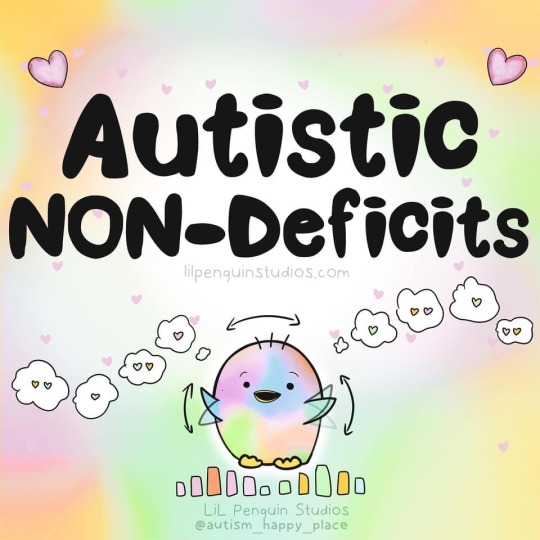
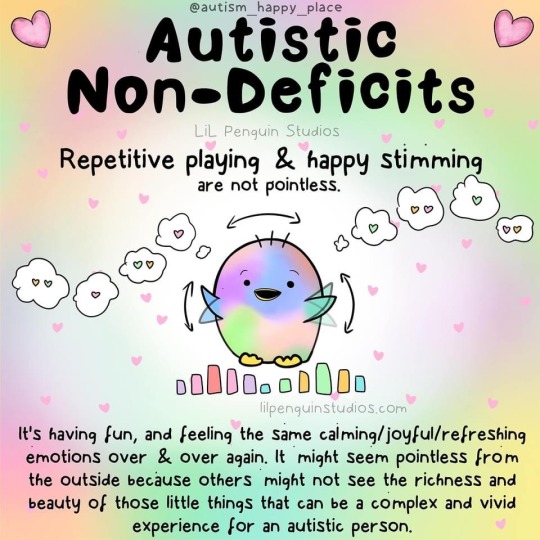
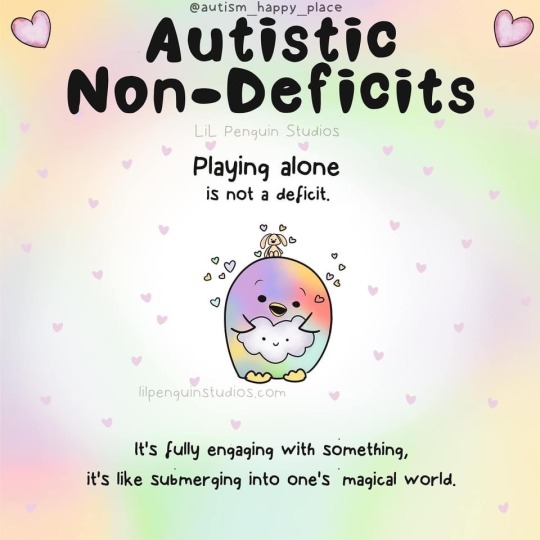

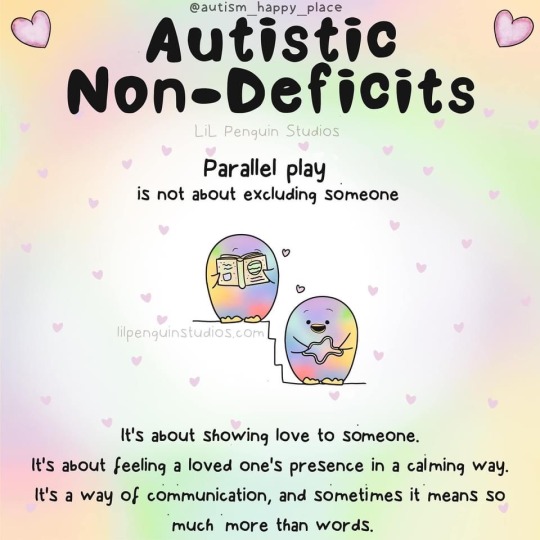
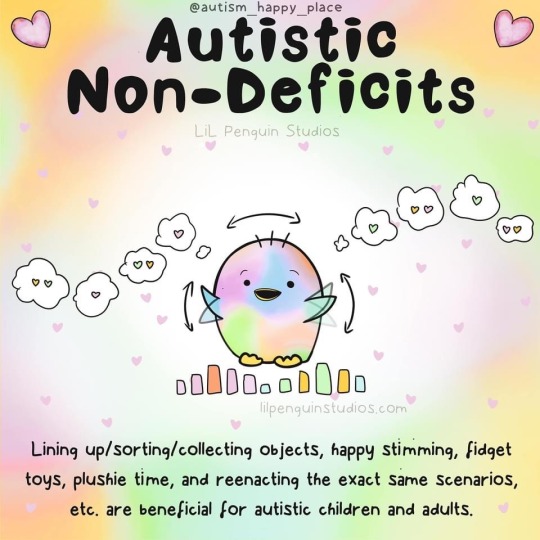

Lil Penguin Studios/Autism Happy Place
#autism#actually autistic#autistic non deficits#posotivevibes#autism traits#neurodivergence#neurodiversity#actually neurodivergent#feel free to share/reblog#lil penguin studios/autism happy place (facebook)
514 notes
·
View notes
Text
This is your daily reminder that "neurodivergent traits" do not exist.
"Neurodivergent" is an extremely broad term that refers to anyone who has some kind of neurological and/or psychiatric condition that causes them to be significantly different from most of society. It's up to the person themselves whether they want to use that label based on their personal experience, but here's a (non-exhaustive) list of conditions that can be neurodivergent:
Autism spectrum disorder
Attention-deficit/hyperactivity disorder
Dyslexia
Dyscalculia
Dysgraphia
Dyspraxia
Sensory processing disorder
Auditory processing disorder
Visual processing disorder
Various kinds of mutism
Language disorders
Tourette's Syndrome and other tic disorders
Functional neurological disorder
Aphantasia
Prosopagnosia
Synthesia
Conduct disorder
All personality disorders
Obsessive-compulsive disorder
Bipolar disorder
Schizophrenia and schizoaffective disorder
Fetal alcohol syndrome/fetal alcohol spectrum disorder
Post-traumatic stress disorder and complex post-traumatic stress disorder
Dissociative identity disorder, OSDD-1a and OSDD-1b
Traumatic brain injury
I could go on.
For a "neurodivergent trait" to exist, it would have to apply to all of those, plus more conditions I forgot to include. Obviously not possible. The only actual "neurodivergent trait" would be "you have a neurological/psychiatric condition".
If you mean autistic and ADHD traits, say that. If you mean mood disorder traits, say that. Neurodivergent is such a broad term, you need to use accurate language to ensure you don't accidentally spread misinformation (which has happened multiple times with the term "neueodivergent traits".)
#neurodivergent#neurodiversity#neurodivergency#actually neurodivergent#mental health#mentally ill#disabled#autism#adhd#ocd#dyslexia#dyscalculia#tic disorder#personality disorder#ptsd#cptsd#bipolar disorder#schizophrenia
2K notes
·
View notes
Text
Haruka isn’t autistic-coded – he has an intellectual disability (and why that matters)
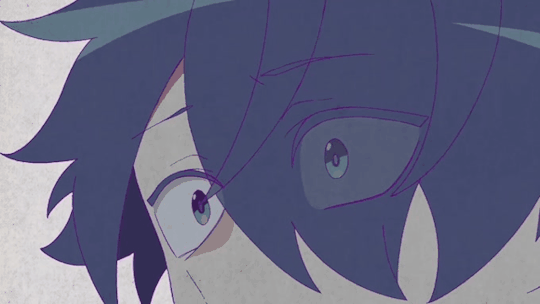
(AO3 Mirror)
A lot of people in the MILGRAM fandom (especially English-speaking MILGRAM fandom) state that Haruka is autistic-coded, as if it’s fact. Most recognize that Haruka is coded as disabled. (If you didn’t recognize that, I hope this post will help to explain why.) However, to state that he is coded as autistic specifically is incorrect. Haruka is coded as intellectually disabled.
Now, there are likely two things that contribute to this issue. One is the invisibility of intellectual disability as a whole, and another is the fact that a lot of this has to do with things that only someone who speaks Japanese would understand (such as complex vs non-complex words in Japanese).
In this post, I plan to lay out what an intellectual disability is and how it differs from neurodivergencies such as autism or ADHD. After that, I want to discuss the way Haruka speaks and uses words, the symbolism in his MVs, and how this lends to him being coded as intellectually disabled. Finally, I want to discuss why this even matters at all. Because, in truth, viewing Haruka as autistic instead of intellectually disabled leaves the viewer misunderstanding his story in a huge way that seems far too common in English-speaking MILGRAM fandom. So, I hope you listen to what I have to say.
What does it mean to be intellectually disabled?
Confusing autism and intellectual disability (henceforth referred to as ID) is not an issue unique to the MILGRAM fandom. They are quite commonly mistaken for each other, in the same way that autism and ADHD are both commonly mistaken for each other. And for the same reason, too – autism and ID are comorbid. This means that, if someone is autistic, they are more likely to have an ID. For this reason, it makes perfect sense to headcanon Haruka as autistic. I headcanon him as autistic, myself, actually. But, in this post, I’m going to be strictly talking about his coding, not headcanons, and he is very specifically coded with an ID.
So, what’s the difference? In the words of the National Institutes of Health, “Whereas ID is associated with general deficits across developmental domains, ASD is in fact defined by the observation that social communication deficits are particularly impairing.” (Source)
To say this in layman’s terms, autism is primarily characterized by difficulties in social communications. Cognitive abilities in autistic individuals vary, just like with allistic individuals, but the defining features are issues with social interaction and nonverbal communication. Autism by itself effects how effectively one communicates, but not intelligence. On the other hand, ID is a limitation on intellectual functioning, just like the name implies. This causes issues in areas like learning, problem-solving, and abstract reasoning.
A lot of people think ID is a synonym for ‘learning disability’. ‘Learning disability’ is an umbrella term that covers things such as dyslexia and dysgraphia. This isn’t the case. For one thing, ID can be a diagnosis on its own. ID is subdivided into syndromic ID, where intellectual deficits are present with other signs and symptoms, and nonsyndromic ID, where ID is, itself, the diagnosis. Examples of syndromic IDs include fragile X syndrome, and Down syndrome. For another, those with learning disabilities tend to have average to above-average intellectual abilities. Their disorder affects their ability to acquire and process information, but they are still able to learn. In contrast, ID affects the ability to learn at all, as well as affecting development and general function.
ID is a debilitating disorder. Many people with an ID cannot live independently, require help with self-care activities, and have limited communicative abilities. Understanding this – particularly, how ID is often a disability that requires a caregiver – is a key point to understanding Haruka as a character. But that’s to be covered later.
Words
The reason why this is a problem in the English fandom specifically is because the main thing tipping off the viewer to Haruka’s ID is the way that he speaks.
‘Weakness’, Haruka’s first-trial song, is written entirely in INCREDIBLY basic, elementary-level kanji – mostly hiragana and katakana. In fact, his first-trial song is misspelled in a lot of official releases of the song (‘Weekness’), which is a good way to get the same effect across. This is not the case across all platforms, though, for whatever reason. He also writes, in his trial 1 interrogation, with only that elementary-level kanji; often only one-word answers. The only complicated characters he knows are usually ones that mean something along the lines of, “I’m a stupid, idiot child,” which can be assumed to be because that’s what he has heard his whole life.
While I’m unsure if it is ENTIRELY in this basic kanji, his second trial song and interrogation is at least mostly written like this, as well. At this point, Muu is teaching him how to read and write (or, that’s what’s implied), but, even with that one-on-one attention, he is still speaking like a child most of the time to the Japanese ear.
When he’s forced to use or listen to words outside of this elementary-level kanji, he gets audibly confused, as well. In the AVIOT earbud collab, he has the voiceline, “Pairing seems to be in progress,” but, if you listen, he says “pairing” like it’s a question. (“Pair-ing?”) He doesn’t know the word is an English loanword that isn’t often used in everyday conversation, so he’s struggling to say it.
He also struggles when speaking to Es in his interrogations. He tries to say, “I will acknowledge any falsehood or silence,” but the words used are very advanced in Japanese. As such, he struggles with it, repeating, “False-hood? Si-lence?” Multiple similar exchanges happen in his interrogations, with Haruka misunderstanding words Es uses, and stuttering over unfamiliar words. The implication is that Haruka struggles with higher vocabulary or unfamiliar words, and with speaking and communication in general. He apologizes multiple times to Es for struggling, saying that he is not intelligent as an explanation multiple times. Additionally, in his second trial investigation, he talks about how he could never do the same things as everyone around him. When Es calls him stupid, he agrees. Es even states, “You really have no learning ability whatsoever.” When, mind you, having delayed or slowed learning is, like, the symptom of intellectual disability. It’s quite blatant. (Why is this not fandom consensus yet, again?)
Moving on from the point of how Haruka uses words, we can talk about other forms of word-based MILGRAM media. For example: when introducing himself, he says he thinks he’s 17, which implies that he isn’t actually sure. Additionally, there is lots of evidence for his intellectual disability in his interrogation questions:
He considers it impossible to learn another language
His dream is to ‘live normally’
He states he disappointed his father (not inherently an ID-related thing, but also, makes sense with his coding in mind)
Many answers imply that he’s been unable to live his own life, and he doesn’t really have any aspirations outside of being given attention
Finally, we have the lyrics to his songs. Again, on top of being written in very basic kanji, we have lines like the following, which include repeated themes of needing a caregiver (being ‘hopeless’ by himself), not being able to do what others can do, hating how he was born, and struggling to function. (I have bolded examples that I think are especially apt.)
“Why was I born like this? Why does it hurt so much?” / “Why was I born to be me? Why does it hurt so much?”
“Instead you kept calling me “hopeless” / You never called me by my name / You were always comparing me to someone else”
“If I tried and couldn’t say it, you would get angry at me and say “You’re hopeless”” / “When I tried to understand it, you’ll make that disappointed face again”
“I just wanted to be your good boy” (what did the MILGRAM team want us to think when they included this line? likely that he’s childish or ‘hasn’t grown up’, right?)
“Mommy, look / I’ve done great” (calling her ‘mommy’ instead of ‘mom’ – again, ask what the MILGRAM team wants us to think when they included this)
“If only I could do what anyone else could do”
“It’s enough, I am a “disappointment””
“My life started in a wrong spot”
With regards to his relationship with Muu, he doesn’t understand why Muu using him would be a bad thing, or how she is manipulating him. People with ID tend to have poor judgment, and Haruka not being able to tell the difference and not caring about the difference between negative and positive attention shows this (although his trauma definitely also plays a role).
Finally, we have the trial song titles.
We’ve already discussed how “Weakness” is sometimes alternatively misspelled as “Weekness”, and that is because the title in Japanese is, arguably, misspelled, too. The Japanese title is a play on the phrase jakuniku kyoushoku, which is equivalent to the English phrase, “Survival of the fittest.” More directly, it translates to, “The weak are meat, the strong do eat.” The character for “strong” (kyou) is replaced by “together” (also kyou) – with the implication being that Haruka forgot which version of the word was correct for this situation. This also works to create a pun, of sorts, as this makes the title more like, “The weak are meat, communal eating”, creating an emphasis on the fact that there are more people eating than there are ‘weak people’. There are differing ways to interpret this pun, but one way is to view it as a statement on Haruka’s status as a minority, oppressed (‘eaten’) by the majority.
On the other hand, we have All-Knowing and All-Agony. In Japanese, this song title is Zenchi Zennou, which can be translated as “Omniscient and Omnipotent”, used to describe the Christian God. Once again, we have what we can assume is Haruka misspelling the title, creating a pun. One that is much more on the nose, as the character for “ability” (nou) is replaced with the character for “worry, distress, pain” (also nou).
It seems that the reason why Haruka uses new complicated words (aside from the words meaning “idiot” and the like) in All-Knowing and All-Agony is because Muu is teaching him. It features the more complicated “食” (shoku; food), when we know from Haruka’s 2023 birthday portal that Muu is bringing him meals. It also prominently features Muu’s name, 夢 (yume; dream), which is more complicated, as well.
Imagery
Now, we get on to the non-verbal, more visually-based evidence for Haruka’s ID. Be prepared for a lot more images!
Going back to Muu teaching Haruka how to write: it’s not just clear in his usage of kanji, but also how he writes. Comparing his handwriting, it becomes much easier to read after Trial 2’s start, and his writing is soft and bubbly; much like a teen girl’s writing might be.
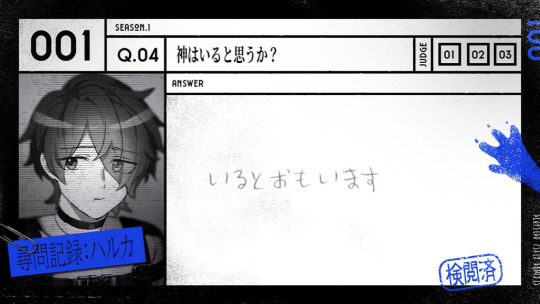

All of these improvements are able to be linked back to Muu (both his style of writing and in the more complicated words that he knows), who we know is looking after him. Considering this, it’s pretty clear why he sees her like a maternal figure.
One of the Minigram comics shows the prisoners eating curry udon together. Of the four shown (Amane, Haruka, Shidou and Mahiru), Amane and Haruka are the only two who make messes out of their clothes. Since the other two characters in the comic have active roles, and Haruka has the most passive one, Haruka’s inclusion can be assumed to be because he is the only prisoner aside from the child, Amane, who would make a mess while eating.

Childish themes and imagery are seen scattered throughout his MV, as well, especially his first one. He draws with the skill level of a child, which is a very prevalent motif, and he is shown to sleep with a plushie.
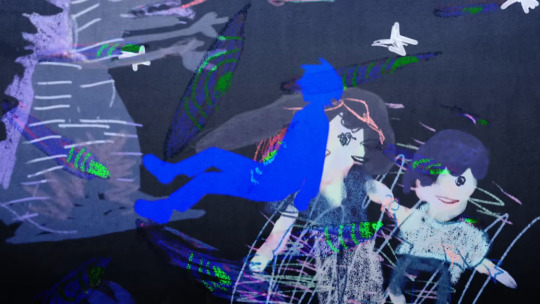
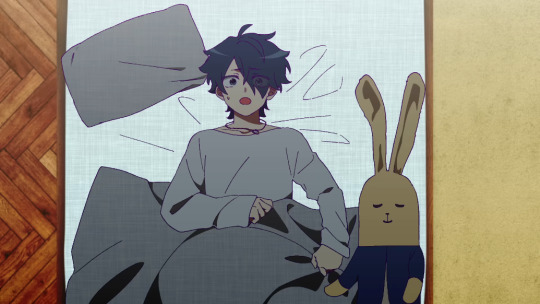
Additionally, he seems to have trouble putting on his clothes. He wears two entirely different socks – not just different colors, but also two different lengths. His pant legs are also two different lengths when he tries to roll them up in his Trial 2 art, and he seems to exclusively wear slip-on shoes up until he befriends Muu (where we can presume that she begins helping him, and even then, they're not done properly).
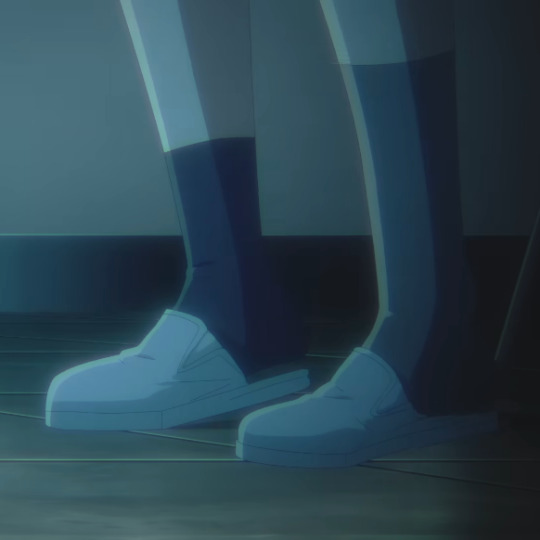

There are various visual parallels drawn between himself as a child and himself as he is now (for example, the way that his clothes are a mix of his current shirt and the vest he wore as a child in All-Knowing and All-Agony), and he often compares himself to a child wanting praise.

Even the violent acts that Haruka is shown committing are also a sign of an ID. People with IDs tend to have meltdowns, and devolve into fits of violence. The reasons for these meltdowns vary depending on the person, but reasons can include anger / frustration (especially in reaction to not being able to communicate well), sensory overload, and confusion.
You may note that Haruka’s mother reacts the exact wrong way for dealing with these meltdowns. When trying to help someone experiencing a meltdown, especially a violent meltdown, the last thing you want to do is appear frightened. The number one piece of advice everyone gives for helping someone experiencing a meltdown is to remain calm. It’s also not advised to leave the person alone, either, because that sends the message, “I want to avoid you when you feel this way.” (Which I suppose, for a neglectful mother like Haruka’s, would be technically accurate, but still not at all helpful.)
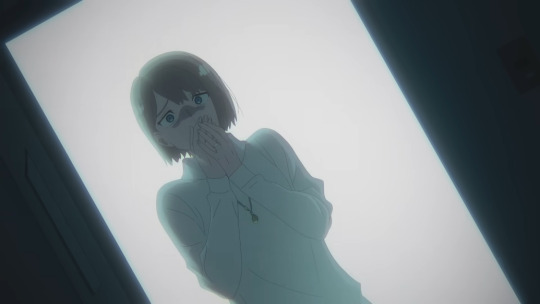
It only makes sense that Haruka’s tantrums continue to get worse and worse.

But after the meltdowns fade, he seems to not understand what he’s done. He’s shown experiencing fear and confusion after he hurts something, even shown as his child self at one point. A major part of IDs is being unable to connect actions to consequences.
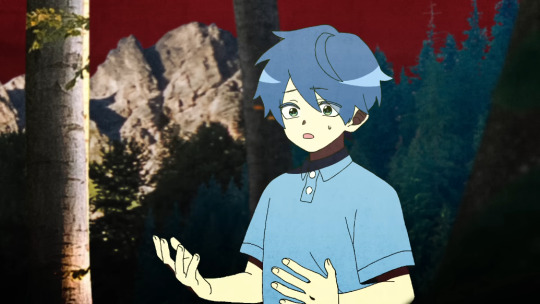


Finally, we go onto his body language. Frankly, I considered putting, “Imagine this as a real person doing these things and not an anime boy, and you’ll see my point.” Which is true. But I decided to go a little more in depth.
Swaying is heavily associated with people with IDs. This is, in part, because people with IDs have reduced postural balance, and general body balance. Because of that lack of postural balance, people with IDs tend to slump quite heavily, as well. Both of these traits are shown very obviously with Haruka, in All-Knowing and All-Agony.

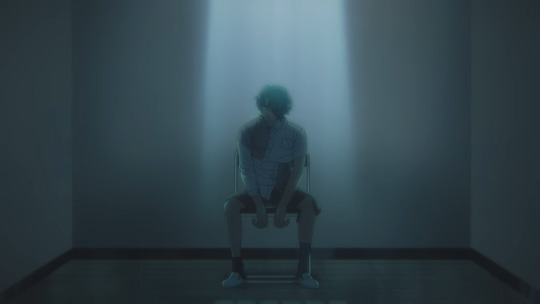
In the same MV, he’s also shown biting his nails. Like autistic people, people with IDs stim, and this could also be a version of hand mouthing (repetitive contact between the hands and the mouth / tongue), which is also heavily associated with / often seen in intellectually disabled people. He's also shown doing this in promo art.


So, why does this matter?
Haruka being intellectually disabled is a huge part of his story, and, when taking it into consideration, it changes how one views his story a lot.
Haruka being treated better as a child makes more sense with this framework. He wants to return to when he was a child because his level of intellect then was seen as more ‘normal’. There wasn’t as much obviously ‘wrong’ with him yet. Children are expected to be a little slow, but it’s when they remain that way that many parents begin to become concerned. He yearns for when his mother didn’t know he was disabled, and when she treated him better for that reason.
Haruka being severely neglected / abused by his mother would be awful, no matter what, but him being intellectually disabled makes it so much worse. He needs attention and care from his caregivers even more so than the average child does, because he has trouble even functioning on the day-to-day without help. This is why he thrives under Muu’s care; she is meeting his support needs. Likely not perfectly (she’s just a teenage girl, and she is almost certainly not trained or educated in this regard), but even with the amount of support that she is able to give, Haruka is thriving. He’s more confident, he’s learning how to write, and he’s eating more consistently.
Without that care, he struggles so severely that he melts down regularly, going into fits of violence over the fact that his support needs aren’t being met (on top of all of the other emotional baggage that comes with any child being neglected by their parent). Haruka’s mother continued to ignore these cries for attention, for help, for care… Until it went too far.
The way that Haruka’s story is viewed changes drastically with this information. If Haruka was autistic, it would affect very few of the things that I listed. So much of Haruka's story hinges on specifically his intelligence level, not how he socializes. And do you have any idea how many people I’ve seen say, “He’s a neurodivergent with a shitty mom, but so am I, and I didn’t kill anyone about it”? No. If you are not intellectually disabled, you do not get to compare your experiences as if they are equal. If you don’t have an ID, your experiences cannot be compared in this way.
Haruka has a debilitating disability that requires support which he was not getting. He was experiencing ableist abuse at the hands of his mother, and he didn’t know how to handle it. All of his violence happened during his meltdowns, and his disability makes it harder for him to connect his actions to the consequences, or find alternate ways to solve his problems – this is all extremely important information and context when you’re discussing whether or not his crime is forgivable.
If you still don’t forgive him, that’s alright. But to neglect this aspect of his character is, to be frank, baffling, if you’re trying to participate in the spirit of the series and understand everyone’s crime to the fullest extent. And to make jokes, comparing your own experiences to Haruka’s, since you assume him to be neurodivergent and nothing else, does a huge disservice to his story! And, when it’s done to demean him? It honestly comes off a slight bit ableist.
So, I’d like everyone to keep this information in mind moving forward. Don’t infantilize Haruka for his disability. But do consider this information in your analysis posts, your discussions, and so on. I’d like to see this become common knowledge in the MILGRAM fandom, especially since the idea of him being specifically autistic-coded is so widespread by this point.
Thank you!

#haruka sakurai#milgram#the milgram project#milgram meta#milgram analysis#intellectual disability#haruka#sakurai haruka#azure does a thing
338 notes
·
View notes
Text
wish there are less people invested in one single narrative of nonspeaking / nonverbal identity.
feels like there many different “traditions” or something of nonverbal nonspeaking activists and each small community all says same thing, same origin story same definitions same words same talk points. and I understand this because we are all autistic! we are all echolalic we all echo language and ideas from the community we surround selves with. but find it really hard when echo words becomes ddogma becomes thing you can’t say differently and just assume everyone thinks same thing or else not really in group.
(going to try to use “nonspeaking” for first community and “nonverbal” for second community because that’s what each one of these communities usually prefer. language hard so sorry if don’t do this consistent.)
like if I go to one of I-ASC (international association on spell to communicate) conference or one of their neuro lyrical events online. as a nonspeaker since birth who does have experience of “learned language without having speech”, of people assume don’t understand anything until finally found way to express self that world understands, and people still doubt am really the one saying this. in some ways relate to these people much much more than people on here who mostly became nonspeaking later in life and have very different upbringing not raised as a person with a DD not grow up without speech. places like the I-ASC and the Spellers community and impAACt and local meet up group for nonspeakers feel like family to me, feel like my people who move and talk and live like me.
but. there things in these community that are very black and white. that just can’t relate to. don’t relate to mantra of “speech is motor, language cognitive” for example. or “it’s not about don’t understand or about I don’t want to, it’s about can’t make body do it.”. because my motor issues interact with language processing interact with cognitive stuff not able to neat separate. yes AAC is freedom but I still have to make a lot of compromises to express self with words. have to leave out a lot or (more often) add a lot unnecessary stuff because there things that brain stuck that just can’t say in a way people will understand.
think this is true for lots more nonspeaking people than organizations like these (which were started + run by speaking people and communication & regulation partners and SLPs) say is true. a lot of nonspeaking people in these communities encouraged by speaking people in movement to focus emphasize on “we don’t have intellectual disability we can communicate with words just as good as you can, the motor problems is all that there we don’t have any language problems .” because this is what parents and speaking autistics and well meaning allies/communication partners think is important. they think the way to value us and to say we feel and think and know and should have rights (which we should!) is to distance distance distance far far away from any associate with intellectual disabilities with language disabilities with cognitive disabilities with process differently.
so as long as can be acceptable enough nonspeaker to them they support. which does not feel like support. nonspeaking doesn’t mean non thinking but intellectual disability and language deficit and cognitive disability doesn’t mean non thinking too. and a lot of people in these communities do have more complicated relationships with language but are told by speaking people in these communities to not talk about that only talk about motor stuff or connect everything back to motor stuff. which doesn’t feel like support. feels like flatten make easier make more convenient.
and then when I go on tumblr and see the nonverbal people speaking out here. i started out not on social media mostly in offline AAC and speller advocacy and someone told me there was good community of autistics with good range of support needs on tumblr so I joined. and do find bigger range of autistic and nonverbal nonspeaking experiences able to talk about here. able to talk about mental illness & psychosis & dissociation (which even nonspeaking advocacy communities assume nonspeaking people don’t have these problems or not capable). able to talk about “challenging” behaviors that so so stigmatized. able to talk about language and cognitive stuff. able to talk about gender and queerness without be policed (a lot of professionals and communication support people in nonspeaking advocacy are weird conservative and don’t think can know our genders / sexualities even though always talk about presume competence. it weird.) just saw beautiful post about nonverbal trans experience with gender that I loved. really like that people with intellectual disability getting heard, that we challenge expectation to have “proper” writen language. speech therapy and even learning how to use AAC, learning how to use letterboard etc was always about correct every mistake, about fade prompting, about use grammar properly so other people think competent. and have been able to let go of that on here because the language norms are so so different.
but at the same time I feel like there lot more stuff that not useful. lot of focus on right words to say, a lot of calling out other blogs, a lot of trolls, lot of drama that really doesn’t exist in real life nonspeaking community. like frustrated when go in nonverbal or nonspeaking tag and most posts not about nonverbal people human rights or experience, but about words. specific about people saying go nonverbal, someone trying to say it’s good or someone trying to say it’s bad. every other post about someone ask for right word to say instead of “go nonverbal”, or list of other words to say. or people asking whether or not they’re nonverbal or semiverbal or lose speech. and even within nonverbal community on here lot more talk about words than about justice. or even about lived experience of be nonverbal. people forget that real world outside tumblr tags exist sometimes. that there people living without communication, people being deny communication, people in institutions, people without resources. and that there are ways to change that and to self advocate besides changing what word you call yourself.
not saying words not important. yes it is annoying and bad when people talk abouit going nonverbal and forget that we exist. yes am grateful to people who decide to change what word they call themself to not erase us. but frustrated with how there not really conversation, one opinion just take as The Nonverbal Opinion, just like how it is in offline nonspeaking / speller community.
not seem like these communities are interacting, are compare notes on experience are combine to synthesize into something better. into what community could be. community that leaves no one behind. community that doesn’t claim to speak for everyone, doesn’t claim account for all experiences but still says all nonspeakers exist and all deserve rights. doesn’t tell anyone “don’t talk about your experience with X because it doesn’t fit what we want to tell the world that nonspeaking people are like.” where everything able to be talked about without it ever make less true that all of us need respect and rights more than any one word / idea.
curious if anyone have ideas for how to make this community.
#new pinned post hello#am in AAC user discord server where it does seem like there people from all these different tradition & belief & experience#but even that mostly have people who grew up speaking and not a lot of full time AAC users#nonverbal#nonspeaking#community#lav talkz#long post#AAC#disability#dd stuff
80 notes
·
View notes
Text
LUFFY HAS AUTISM
From the very beginning of my time watching One Piece, I felt a deeper connection to Luffy and his behaviours, and over time, as I analyzed Luffy, I noticed a pattern in his behaviour, and it clicked to me that he may be Autistic.
In this post I will be heavily going off of the link below, since this is not a serious work made to be read by more than just some tumblr users, I will be plagiarizing from said link.
"To meet diagnostic criteria for ASD according to DSM-5, a child must have persistent deficits in each of three areas of social communication and interaction, plus at least two of four types of restricted, repetitive behaviors"
Let us go through the criteria and point out which of the criteria applies to Monkey D. Luffy.
A. Persistent deficits in social communication and social interaction across multiple contexts, as manifested by the following, currently or by history
1. Deficits in social-emotional reciprocity, ranging, for example, from abnormal social approach and failure of normal back-and-forth conversation; to reduced sharing of interests, emotions, or affect; to failure to initiate or respond to social interactions.
Luffy has an abnormal social approach, which takes the form of inappropriate touching (touching/grabbing/poking at strangers), and 'forced' friendship (insists everyone is his friend, immediately welcomes them into his life, and even invites almost strangers to be part of his crew). He also fails to maintain back and forth conversation, often interrupting and/or hogging the conversation to talk about his interests and thoughts in particular.
He also fails to respond to social interactions, often completely ignoring when someone is talking to him or failing to follow rules, orders, and/or suggestions. His interests are limited, and he usually only talks about food (more specifically meat) and fighting. Luffy does not take hints or read between the lines; even when people tell him no or ask him not to do something, he does it anyway. Of course, said things end up being in the best interest of those people, but he still doesn't listen.
Luffy is not someone who displays "common sense" a lot, particularly when telling people things that may be hard to hear. He does not understand the concept of telling white lies or saving someone from embarrassment or hurt feelings by being polite. He is very blunt about things and does not beat around the bush. For example, when breaking the news to Tama about Ace's death, he simply told her "Ace is dead'' and that was that. He neglects to think about the fact that something so blunt and serious may be difficult for an 8 year old to process.
It's also worth noting that Luffy does not take orders from anyone, or stick to a plan, often abandoning his planned-out strategies with Trafalgar Law, and instead doing things his way; winging it and hoping everything will work out. He has repeatedly gone against Law's plans and suggestions, as well as the rest of his crew.
2. Deficits in nonverbal communicative behaviors used for social interaction, ranging, for example, from poorly integrated verbal and nonverbal communication; to abnormalities in eye contact and body language or deficits in understanding and use of gestures; to a total lack of facial expressions and nonverbal communication.
Luffy uses excessive facial expressions and non-verbal communication, which is often associated with autism (despite these criteria focusing on the opposite). He also makes excessive eye contact or none at all, often using his feet for things meant for his hands, and picks his nose even though it's deemed rude and unsanitary. He also has abnormal verbal communication, saying things that don't make sense to others (i.e thinking he was insulting Zoro by calling him 'three swords', then when Usopp pointed out that Luffy wasn't insulting him, Luffy changed his "insult" to 'four swords')
3. Deficits in developing, maintaining, and understanding relationships, ranging, for example, from difficulties adjusting behavior to suit various social contexts; to difficulties in sharing imaginative play or in making friends; to the absence of interest in peers.
Luffy is incredibly good at making friends and making others feel welcomed and safe in his circle. He experiences no deficits in this area; however, as stated earlier, his means of building relationships is very abnormal and exhibits autistic behaviour. He has difficulty adjusting his behaviour to suit various social contexts, such as picking his nose, burping, slurping food, being generally ill-mannered at fancy restaurants, yet always making sure to thank the waiter/barkeep, etc. after every meal.
B. Restricted, repetitive patterns of behavior, interests, or activities, as manifested by at least two of the following, currently or by history.
1. Stereotyped or repetitive motor movements, use of objects, or speech (e.g., simple motor stereotypes, lining up toys or flipping objects, echolalia, idiosyncratic phrases).
Luffy expresses repetitive motor movements/speech, often clapping his feet together, clapping his hands, and laughing at everything even when things aren't funny. He smiles and laughs in serious/ life-threatening situations.
2. Insistence on sameness, inflexible adherence to routines, or ritualized patterns of verbal or nonverbal behavior (e.g., extreme distress at small changes, difficulties with transitions, rigid thinking patterns, greeting rituals, need to take the same route or eat the same food every day).
Luffy is insistent on eating meat every single day at every meal. While his diet is not in the least bit restrictive, he expresses the ritualistic behaviour of eating meat at every meal, every day. It's also common for Luffy to have a 'one-track mind', often only thinking about food or fighting. It is also worth noting that it's common for people with Autism to have an obsession with food.
3. Highly restricted, fixated interests that are abnormal in intensity or focus (e.g., strong attachment to or preoccupation with unusual objects, excessively circumscribed, or perseverative interests).
Luffy has only one goal, and that's to become king of the pirates. He does not ever let anything get in the way of said goal. He also has an incredibly strong attachment to his straw hat, which Shanks gave to him over 10 years ago, he is very careful with his hat, and gets very aggressive and mad when someone touches, takes, or damages his hat. Luffy also has a unique and string fascination for bugs, more specifically beetles. He has been shown to always be interested in them, pointing out different species, talking about them and naming off facts about them, and even wearing clothes with pictures of them or wearing clothes that look like them (the samurai gear from wano for example)
4. Hyper- or hypo reactivity to sensory input or unusual interest in sensory aspects of the environment (e.g, apparent indifference to pain/temperature, adverse response to specific sounds or textures, excessive smelling or touching of objects, visual fascination with lights or movement).
Luffy is easily distracted and fascinated. Things like lights, bugs, smells, sounds, food, etc. all grab his attention very easily. He also has an indifference to pain and temperature, often not realizing or feeling anything until someone points it out. For example, on both drum island and punk hazard, Luffy did not feel cold until some of his crew mates pointed out that he was not properly dressed for the winter and asked if he was cold. Luffy also likes to touch just about everything he can, even things that don't belong to him. He has a keen sense of smell and has remarkable hearing (often hearing things that others don't) although that can be chalked up to the Voice of All Things.
C. Symptoms must be present in the early developmental period (but may not become fully manifest until social demands exceed limited capacities or may be masked by learned strategies in later life).
Luffy has experienced all symptoms from an early age, which developed further once he set off on his journey to becoming a pirate captain. He has been this way since he was a child, and he has no apparent reason for this behaviour other than it simply being how he is.
D. Symptoms cause clinically significant impairment in social, occupational, or other important areas of current functioning.
Every symptom is shown to affect him in his day-to-day life, both positively and negatively. They cause significant impairment in social functionality. Luffy is often seen as childish and unable to function on his own without the help of his crewmates. He can not cook or navigate, two very important skills to have as a young adult, which can be attributed to a developmental delay, aka Autism. This does not mean in any way that Luffy isn't smart or capable of handling himself; this just means he isn't as independent as someone who is Neurotypical would be.
In conclusion, Luffy experiences persistent deficits in each of three areas of social communication and interaction and meets 4/4 of the criteria listed in part B, making him autistic.
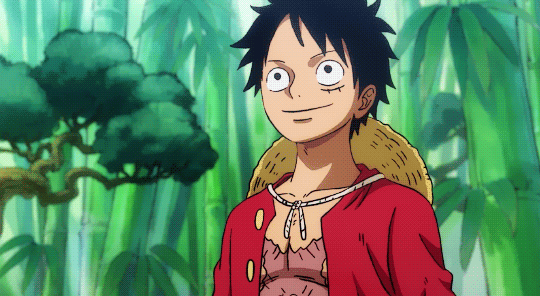
#rinny rambles#my writing#one piece#op#anime#luffy#monkey d luffy#monkey d. luffy#straw hat luffy#mugiwara no luffy#autism#autism headcanon#luffy is autistic#autistic characters#autistic headcanon#actually autistic#autistic writer
237 notes
·
View notes
Text
yeS
Most of the time, when you hear the word 'non-verbal', it refers to autistic people who cannot verbalize speech (and the nuances within that, could be a whole separate post, etc.,.)
But i'm diagnosed with a Non-verbal learning disability and the amount of times when people hear that and they reply with "but you can talk!" drives me INSANEEE
The term non-verbal learning disability is talking about "Non-verbal" in an entirely different context; it has nothing to do with speaking mouth words!
It's actual quite literal in its meaning; it is a disorder in understanding the unspoken, the non-verbal, i.e., body language, sarcasm, social rules, and also most significantly in non-language based learning subjects like math. In fact, hyper-verbility is an identifier of the disorder and we tend to excel in language-based learning, making our deficits in math and non-verbal language appear almost jarring in comparison.
Clinical words can have different meanings in different contexts, and it happens more often than you think!
Rarely a term you think is "only" used for a certain disorder will be true, because most of these terms are just symptoms and symptoms can be varying and shared across thousands of disorders without being related.
51 notes
·
View notes
Text
Dean Winchester autistic theory
I went through DSM with Dean, because of course I did.
Reasons why I think Dean is autistic based on DSM:
I. Social Communication
A. Social reciprocity
1.abnormal social approach
*Dean struggles to get information from others without Sam's help
*he is sucessful at picking up woman, but seams to use a series of scripts and well practiced pick up lines to do so
*does not have friends in early seasons
2. no back in forth conversation
*Dean does not seam to notice when he's lost people in conversations (which he often does with excessive media references)
*when they give him undeniable signs he's confused them he ends to go with something dismissive "whatever" and moves on
3. reduced sharing interests emotions or affect
*he tends not to remember things people say that don't interest him
*mocks his brother and cas for interests that he doesn't share
B. deficits in non verbal communication
1. poorly integrated verbal and non-verbal communication
*excessive media references
*often practices facial expressions, sometimes in the mirror
2. abnormal eye contact and body language/gestures
*Dean can certainly make eye contact, but he does tend to do better with emotional conversations when he is not making eye contact (often while driving or while sitting on the car, but also when Charlie is in changing room in (Larp and the Real Girl)
*seams uncomfortable with hugs (particularly with Garth). Hugging his brother makes his brother worry about him
3. lack of facial expressions/nonverbal communication
*Dean does have a lot of expressions, but he tends to go a bit blank faced when dealing with big emotions and/or lies
C. Deficits in developing maintaining and understanding relationships
*Dean notably struggles to have long term romantic relationships. He has one relationship that lasts a bit more than a year (Lisa) and his next longest romantic relationship is a few weeks
*Dean does not have many long term friendships, much of this is because of the death of the people that he would be friends with, but this is not often the case. Dean's life is marked by loneliness, and he seams to only be able to maintain friendships with either family members or when they revolve around the job (hunting).
Dean defines family in a static way. I.e. living with his brother, thinking his brother going to college was abandoning. confused as to why his mother didn't want to stay with her adult sons forever
*He also seams not to have a mental category to put "friends" into. He often uses family language with friends
1. difficulty adjusting behavior to suit various social contexts
*shoving food in his mouth while dressed as a priest at a funeral
*telling Cassie that he loved her after only knowing her for a couple of weeks
*in many ways Dean is better at adjusting to social situations than the average person. When he's in an apocalypse world he relishes the tastes of lizards. Being a PA (Hollywood Boulevard), prison (Flosem Prison Blues) When he's in suburbia he plays that role too. He seams to delight putting on different roles. None of these roles tend to last too long. Sometimes his main role of playboy slacker slips in the same way his minor rolls do
2. difficulties in sharing imaginative play
*He engages in LARP with Charlie and the other LARPers however, when he breaks from it he appears to think that it was ridiculous
*he attempts imaginative play with Lucas's army men
*we never see him engage in imaginative play as a child, the few times that he was not responsible he tended to play video games or movies
3. difficulty making friends
4. absence of interest in peers
*Dean scolds Sam for maintaining contact with his college friends, but this might have been about jealousy
II. Restricted repetitive patterns in behavior, interests, or activities
A. Stereotyped or repetitive motor movement
1. simple motor stereotypes
*Dean stimming when he sees the tree in (Last Holiday)
*auditory stim when Sam tells him that he has a lot of work left to do (Usual Suspects)
*often putting pen in his mouth
*often touches things in the background of scenes
*often drums on the steering wheel or sings along to songs
(some of this might be Jensen's ADHD, and not Dean's autism)
2. lining up toys or lining objects
*does not take toys etc. out of car when rebuilding it from scratch
*organized rooms and bags
3. echolalia
*he often quotes TV and movies
*he often mutters things to himself
*"Son of a Bitch" seams to be a phrase that calms him
*"Bitch" "Jerk" is grounding to him, and he seems to be distressed the times that Sam does not finish the sequence
*hums Metallica when he is on a plane, and he's stressed
4. idiosyncratic phrases
*all of the media references/ quotes
*lore quotes (having memorized his dad's notebook almost)
B. instances of sameness, inflexible adherence to routines, or ritualized patterns of verbal or nonverbal behavior
1. extreme distress at small changes
*Dean's reaction to not getting pie
*Dean's reaction to any change with his car
*listens to the same music all the time, introducing new music (Taylor Swift) seams to challenge his identify "I listen to the same five records over and over" Yellow Fever
2. difficulties with transitions
*struggles when life changes occur
3. rigid thinking patterns.
*Dean maintains his black and white thinking (monsters bad, humans good) in the face of evidence to the contrary
*Dean's options about his father take years after his dad's death to change
4. greeting rituals
5. need to take the same route
6. eat the same food
*burgers and pie
C. highly restricted fixed interests that are abnormal in intensity or focus
1. strong attachment to or preoccupation with unusual objects
*Baby
*his pretty little pearl handled gun
*grenade launcher
2. excessively circumscribed or perseverance interests
*Dean's special interests include but are not limited to:
*Dr. Sexy (Changing Chanel)
*cowboys (Tombstone)
*wrestling
*Hell Hazers (Mint Condition)
D. hyper or hyproreactivity to sensory input or unusual interest in sensory aspects of the environment
1. apparent indifference to pain/temperature
*the boy thinks sleep is optional
*he actually appears to have less of a pain tolerance that other hunters (several times he is mocked for other hunters for making noises as bullets are removed), we never see him give himself stitches like Sam and Charlie do
*he does sleep in jeans, which is ignoring discomfort I certainly couldn't
2. adverse response to specific sounds or textures
*his reaction to getting into a suit the first time
*likes to wear the same clothes all the time
*he enjoys good water pressure and soft robes
3. excessive smelling or touching of objects
*he tends to touch a lot of things in the background of scenes
4. visual fascination with lights or movement
*liking his music, and liking it loud
E.Informal evidence
1. Friends with people much older or younger them him
*Dean bonding with kids
*Dean befriending Mildred (Into the Mystic)
2. struggles with table manners
*he shoves food into his mouth
*talks with his mouth full
3. schooling
*Dean is very intelligent (built his own EMF meter, can remember a lot of obscure lore, read Vonnegut)
*he did not graduate high school, although he was still in school what would have been September of his senior year assuming he didn't repeat any grades (After school special). This could have been from moving frequently, but there seams to be other hints that Dean struggled in school
4. Good at Poker and hustling pool
*is it counting cards? is it faking facial expressions due to masking? is it reading microaggressions?
5. Him being a germaphobe
*hates witches because them "spewing bodily fluids" is unsanitary (Malleus Maleficarum)
*several times he dramatically wiped his hands
6. Times that Dean went non-verbal
*after his mom died (Dead in the Water)
*after Cas confessed to him (Despair)
18 notes
·
View notes
Text
The Puzzle Piece Problem

We have to talk about it again. I started this conversation a year ago, when Damiano posted an image of his mom at the Run for Autism. Progetto Filippide is a highly respected organization that does meaningful work for autism and other disabilities. However this iconography is insulting as fuck and seeing Damiano rep it personally in 2023 makes me sick.

Previously, I also expressed concern about the language choices on Progetto Filippide's website. This post is going to focus on the puzzle piece iconography in general, but I do stand by those concerns.
"Ritardo mentale" (mental retardation) which I've since learned is also offensive in Italian when used in this context. "Riabilitativo" (rehabilitation) of autism is not possible. Referring to autism as "diagnosi certificata" (certified) or "conclamata sindrome autistica"(full blown autistic syndrome) excludes people who can't afford or can't access a diagnosis. Also autistics and allistics aren't "affrontando le stesse fatiche, condividendo le stesse emozioni" (facing the same hardships, sharing the same emotions) because one of us is neurodivergent. Sameness isn't the goal.
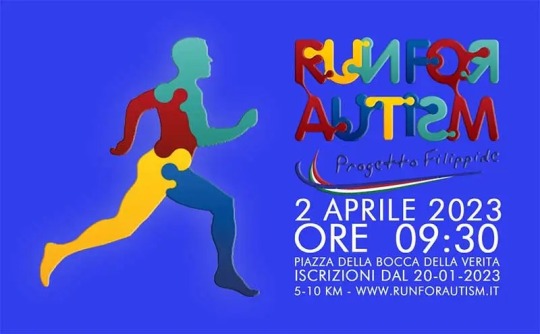
Here is a closer look at the graphic. As you can see, the text and the logo are made out of puzzle pieces. The majority of the autistic community find puzzle pieces as a symbol for autism offensive and many even find it hateful. We have proudly used our own emblem since 2005, a rainbow infinity symbol for neurodiversity.
"For many years adults have openly, publicly discussed their desires for autism awareness to shift to an approach aimed at creating acceptance for us in society. Continuing to ignore our wishes, to use symbols which may remind us of our discrimination in society or that people sometimes do kill us because of our autism, IS disrespectful."
Paula Jessop, All Together Autism (New Zealand)

The original puzzle piece logo was created by Gerald Gasson for the National Autism Society (U.K.) in 1963. The crying child represents the tragedy of autism and the shape represents how "puzzling" Gasson found our condition. To avoid the association, the NAS have since changed their name, scrapped the logo (in 1999), and the whole site is rainbow (like our emblem). That's how embarrassing it is to have used puzzle pieces for autism.

The depiction of autism as a tragedy and sickness resulted in decades of efforts to cure and prevent it. Horrific abuse was suffered at the hands of caregivers, therapists, and physicians who treated autism like a cancer. The puzzle piece itself represents the deficit lens through which autistic people are viewed. We have a piece of the puzzle. We are a fraction of of a person. So the implication is that not being autistic makes you whole. Not being autistic makes you normal. Therefore, autism is inherently inferior. When an autistic person's behavior is measured as good (allistic) or bad (autistic), it's just a measure of how well they can conceal themselves and traits allistics might find "puzzling."

While the NAS invented it, Autism Speaks (U.S.) made the puzzle piece a global symbol through giant, heinous campaigns that seek to silence and eradicate autistic people. Autism Speaks was founded to help families of autistics manage their child, rather than help the child manage their neurodivergence. The most infamous campaigns are Autism Every Day, (> 13 mins long so I've edited together a few clips) and I Am Autism.
youtube
Even worse than these campaigns is Autism Speaks' much beloved Applied Behavioral Analysis. It began with Dr. O. Ivaar Lovaas using electroshock on intellectually disabled patients to stop self harm. The issue with compliance training, is that non-verbal folks communicate through their behavior. Understanding should be the first thing you reach for, and ABA the last since the use of that therapy makes an autistic person 86% more likely to develop PTSD.


I could keep going, but we've established that Autism Speaks is a monster. Yet, the only puzzle pieces we see in their merchandise is their logo. The puzzle piece is their entire brand, their legacy, and Autism Speaks is limiting exposure. Two of the shittest autism organizations in the history of man (the creators of the puzzle piece!!) have very intentionally moved away from that iconography and towards our chosen emblem.
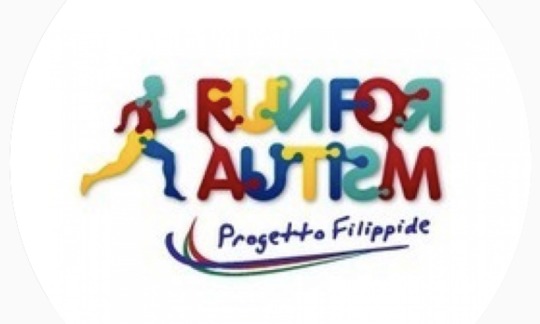
So what the fuck is this?? No, the fact that its a complete puzzle doesn't negate the insult. I am not a puzzle at all! The fact that they think that comparison is fitting says something about how Progetto Filippide view its clientele. Sorry, not sorry.
Autistic people look like puzzles because we're punished for being neurodivergent. We're forced to take ourselves apart, do some curating, and put ourselves back together in a way that appears allistic, but that is not who we are. My autism is not a puzzle. Your society is a puzzle.

This is what neurodivergence is: the potential for an infinite number of unique ways to process the world around us. If you want to support autism in particular, use the gold infinity sign, but either is great! Do you see the giant chasm between how the world views us vs. how we view ourselves?
"Neurodiversity describes the idea that people experience and interact with the world around them in many different ways; there is no one "right" way of thinking, learning, and behaving, and differences are not viewed as deficits."
Dr. Nicole Braumer & Julia Frueh

When you say "well its a great organization" do you think this is what happens? "I'm sure he didn't mean it like that." "If he'd known, he wouldn't have worn it." No. they're still wearing puzzle piece shirts.
Autistics spend their childhoods and adolescence surrounded by people who’d like them to shut up. We’re called annoying, weird, unlikable. We are told nobody wants to be our friend, or likes us, or wants to hear what we have to say. Not only is it really hard for autistics to speak up for themselves because of this, but we’re also waiting in fear of an allistic person who says things the right way, coming along and usurping the conversation. So just listen please.
I won't be debating or defending anything. Feel free to be supportive or ask a question. Nicely.
#actually neurodivergent#actually autistic#actually autism#actuallyautistic#autism awareness#autism#TW: Autism Speaks/ablism
69 notes
·
View notes
Text
Indigo Children, Autism Spectrum Disorder, and Akane Kurashiki: An Analysis
many people interpret the character akane kurashiki from the zero escape games as autistic, a sentiment i fully agree with. however, i haven't seen much active discussion or analysis on the how and why of this interpretation— which i want to change, since it's a far deeper connection than just coincidental coding. uchikoshi may or may not have set out to create an autistic character, but he did certainly create one that has its roots in misunderstandings of neurodivergency.
just to preface, this analysis was written by an autistic individual, so it will come from an insider's perspective. under the cut, there will be major spoilers for each game in the zero escape franchise, as well as brief implications of real world ableism, though nothing graphic is detailed.
now that the intro's out of the way, let's talk about the pseudoscientific concept of indigo children.
the long and short of indigo children is as follows: some special children are born with indigo auras, which signify a number of unusual or even supernatural traits in the child, such as telepathy or supernatural empathy. according to the original coiner of the term, the number of these indigo children has been steadily rising since the last 1960's.
traits that indigo children reportedly have include the following:
high empathy, innate curiosity, and a strong will
are perceived by those around them as being "strange" or "unusual"
have a clear idea of what their purpose in life is and feel entitled or deserving
an inherently accurate intuition
resistance to rigid authorial structures and control from outsiders
a subconscious spiritual strength (though this doesn't necessarily apply to religion or faith)
obviously, these listed traits are nowhere near specific enough to supplement an actual diagnosis for autism. those who believe in the concept and parent a supposed "indigo child" often forego a proper diagnosis, as they believe that autism spectrum disorder is an inherently bad condition (which, to be clear, autism is not bad in any way). however, we can make connections from indigo children to the DSM-5's criteria for autism spectrum disorder.
the most obvious example being the perception of being "strange" or "unusual"— we can easily connect that to social deficits in individuals with ASD.
the resistance to authority and control and feeling entitled most closely matches with an insistence on sameness and their own repetitions.
the innate curiosity and intuition comes into play with special interests and how autistic individuals perceive the world around them.
i want to next list out the non-behavioral evidence that akane was most certainly based on the concept of indigo children.
akane has indigo as a prominent color in her 999 design. notably, her eyes and dress are both shades of indigo, leaning towards lavender.
as an ESPer, akane has telepathic abilities (such as the ability to SHIFT as well as use telepathy by accessing the morphogenetic field).
in ZTD, it's mentioned that the number of ESPers has been on the rise recently in-universe in response to the oncoming radical-6 outbreak.
it's also worth noting that zero escape in general delves into a lot of pseudoscientific concepts throughout the series for narrative purposes.
with everything i've just laid out in mind, i want to make the connection that akane kurashiki, who is based on the indigo children, is autistic, by listing her behaviors over the course of the series that match up with the DSM-5 criteria for ASD.
persistent deficits in social communication and social interaction across multiple contexts (social-emotional reciprocity, nonverbal communicative behaviors used for social interaction, developing, maintaining, and understanding relationships)
social-emotional reciprocity: akane has been shown to talk over others about whatever's on her mind at the time (in particular, this relates to her special interests, elaborated on below).
nonverbal communicative behaviors used for social interaction: there are multiple instances in 999 in particular where she doesn't understand the tone of voice that another character is using, often for comedic purposes. (in particular, the "i might get wet" scene comes to mind.)
developing, maintaining, and understanding relationships: akane has been mentioned in her childhood to have been friendless at school, save for junpei. in the interim between 999 and ZTD, she primarily worked alone. in ZTD's C-END 1, she forgoes her relationship with junpei to make the AB project a success.
restricted, repetitive patterns of behavior, interests, or activities (from the list, i specifically reference insistence on sameness, inflexible adherence to routines, or ritualized patterns of verbal or nonverbal behavior, and highly restricted, fixated interests that are abnormal in intensity or focus)
insistence on sameness, inflexible adherence to routines, or ritualized patterns of verbal or nonverbal behavior: akane is very set in her ways, and insistent on doing things her way (particularly with regards to the AB project). in a way, her "I will achieve the best possible timeline no matter the cost to myself or anyone else" also reminds me of this.
highly restricted, fixated interests that are abnormal in intensity or focus: all of the conversations about psuedoscience, quantum mechanics, and conspiracy theories in 999 contribute to this. it's also evident in the way that she's fixated on rabbits throughout the series.
there's a reason why so many of the autistic individuals i've seen play the zero escape games resonate and adore akane so much- it's because she's a genuine, authentic portrayal of the autistic experience, even if it's never stated outright. she's a flawed, yet idealistic character, with one foot in objective reality and the other in her own perfect world. she is human in the way that so many autistic people are, and i think that's incredible. i hope that we can get more characters like akane in many other works.
if you're curious, i used this wikipedia article as a source for the information about indigo children, and this autism and health article as a source for the DSM-5 criteria for autism spectrum disorder.
25 notes
·
View notes
Note
If I think I may have autism, do you have any idea how I would know?
I don’t want to bring it up to my parents because they’ll likely just shoot it down, coming up with reasons I don’t.
they’re good parents, but they don’t hear me out sometimes.
but what are some of the main, like… symptoms…? ( not trying to be rude)
Greetings, Anon!
"Knowing" whether you're autistic or not depends on how much research you do (self-diagnosis is valid) or if you get an assessment by a professional.
The Autism Spectrum is still misunderstood in society & also by professionals. It's truly necessary that we autistic people advocate for ourselves & that we share our experiences!
Autism is a neurodevelopmental condition, so you are born with it.
The two core symptom cluster, according to the DSM-5, are:
Persistent deficits in social communication & social interaction across multiple contexts: social-emotional reciprocation; non-verbal communication; developing, maintaining & understanding relationships
Restricted, repetitive patterns of behavior, interests, or activities, as manifested by at least two of the following, currently or by history: stimming, persistence in routines & sameness, deep interests (special interests), hypo- or hypersensitivity to sensory input
A non-exhaustive list of my traits:
I don't really understand tone, sarcasm, jokes - basically, I'm a very literal thinker, though I enjoy being sarcastic myself & I did learn some idioms & phrases - time is a great teacher
People would say I have a very fun way of speaking, saying things aloud like: GASP, ANNOYED SIGH, ... which are things you'd usually just... do. But these are kind of my verbal tone tags (I love tone tags in general)
I'm as blunt as it can get, which can make people uncomfortable - I say what I think. I don't feel the necessity in camouflaging & I honestly think it's dumb to do so - it is never meant to hurt someone?
I usually don't want to converse with people & I'd rather spend my days 24/7 in my lab. Social interactions are tiring & often very boring if I'm not interested in the topics (which can be seen as egocentric or arrogant, but I am truly not)
I feel overwhelmed in crowded places. There is too much going on & it's not structured at all - I might have to spend hours or days recharging: alone in my lab, sleeping & stimming - autistic burnout is real
I don't understand relationships at all: e.g. How do you define friendship? What is expected of me?
I'm deeply & deliberately analytical & my decision-making process is methodical rather than efficient (no considering 'gut feelings' of mental shortcuts, as well as pushing feelings aside)
Processing a situation takes more time & energy: bottom-up thinking (allistic people process things in a top-down way)
I have trouble understanding body language & social cues: identifying them is not intuitive for me, I've had to learn a lot... & I still don't pick them up
I also question social norms & rules - most of the time, they seem so arbitrary & unfair to me. But I have learned some, of course - though I don't feel the need to put any energy in it
I have trouble sharing my feelings & showing cognitive empathy (understanding why someone feels something), I am often seen as emotionally 'immature' or arrogant/ not caring when in fact I do, I just don't know how to show it
I have trouble with tone - I can be very cold or too expressive, too loud or too quiet for others, but I don't see it or hear it
Control is my main tool of coping, whether it be what I eat, the order in which my things are placed, my food, ... routine & structure is life! If I don't have control, I will fall apart
I need to know exactly what to expect before I enter an unfamiliar situation or location
I'm hypersensitive to sensory input, especially sound, touch, taste...
I STIM ALL THE TIME.
I experience Meltdowns & Shutdowns from sensory overstimulation & too much socializing, as well as inconsistencies in my schedule
Stress, Meltdowns & Shutdowns can cause me to lose my ability to speak for a certain amount of time
My special interests: Jupiter Jim, Technology, Astrophysics, Quantum Physics... I could think about them all the time & I sometimes forget I am alive - my wonderful ability to hyperfocus
My interoception is bad: I have trouble identifying bodily cues, such as thirst or hunger, as well as needing to sleep or taking care of myself; I'm also a bit hyposensitive to pain
My bad boy image is my mask to camouflage my struggles
...
If you desire to do more research, which I would advice you to, here are some tips:
Please avoid Autism Speaks. !!!!!!!
Get to know the autistic community & get in touch with us, share your experiences, ask us... here on tumblr, I'd recommend checking @my-autism-adhd-blog out. They're doing a great job of sharing information about autism & related neurodivergencies. There are also great creators on Instagram & TikTok too.
The website 'Embrace Autism' is a good source for self-assesments & information
I also recommend: Unmasking Autism by Dr. Devon Prince, as well as the 'Neurodivergent friendly Workbook of DBT Skills' & basically any other piece of literature written by autistic people
If you're into that: some scientific papers about neurodiversity are great too, especially when centered around masking, camouflaging & mental health - but you have to find the good ones (the ones that are neurodivergent positive) - personally, I enjoy reading papers because of their logical & methodical writing & format, it doesn't matter if they're about some cool space data, quantum physics or psychology - statistics are amazing
Thank you for the inbox & I hope I was able to help you out! ✨️
Please don't refrain from asking if you want more input!
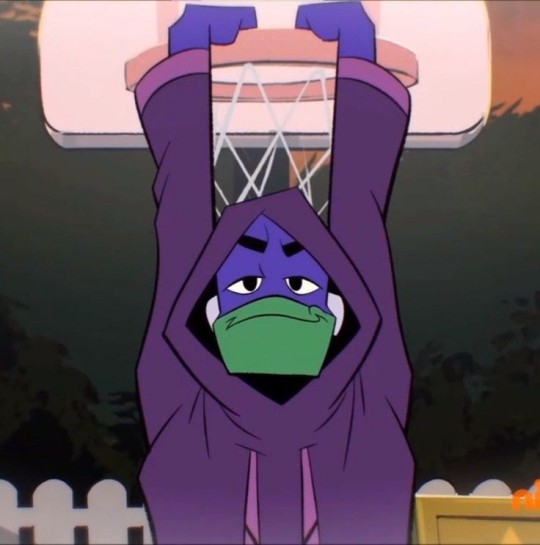
#donnie answers#donnie speaks#donnies special interests#donnies exceptional mind#mikeys world of feelings#neon leons messy mind palace#raph a roni blog#turtle net#rise of the teenage mutant ninja turtles#rottmnt#rottmnt donnie#rottmnt donatello#rise of the tmnt#autism#rottmnt headcanons#rottmnt autistic donnie#autism spectrum disorder#autistic donatello#rise autistic donnie#autistic traits#autistic coded character#rise of the ninja turtles#tmnt#tmnt fandom#rottmnt fandom#rottmnt donatello roleplay
25 notes
·
View notes
Text
Seeing people who clearly have not done their research talk about autism online is fascinating because people will say things that essentially boil down to
"Stop👏 perpetuating👏 stereotypes👏 about👏 autism! Not every autistic person has a) persistent deficits in social-emotional reciprocity, non-verbal communication, and developing and maintaining relationships, and b) two or more of the following: repetitive motor movements/speech, insistence on rigid routines or sameness, highly restricted intense interests, or hypersensitivity to sensory input! Saying that every autistic person has these traits is deeply harmful <3"
47 notes
·
View notes
Text
Autistic Non-Deficients


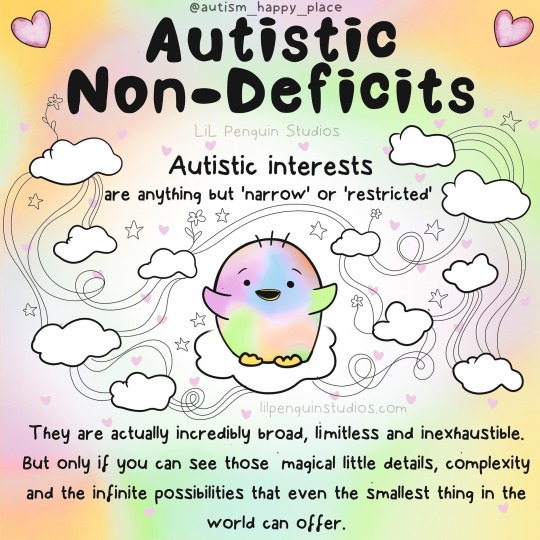

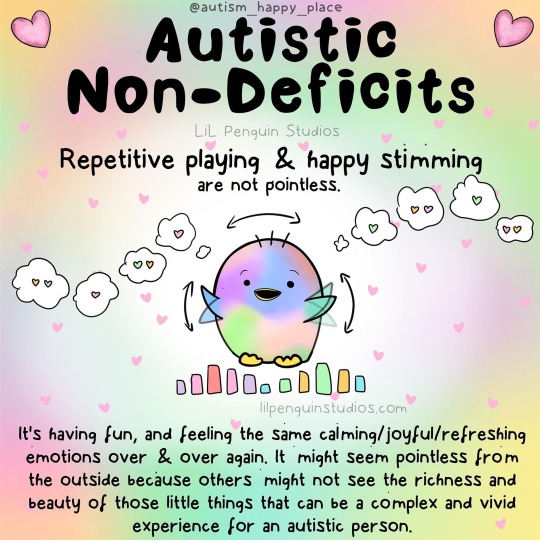

Autism
Lil Penguin Studios/Autism Happy Place
#autism#actually autistic#autism non-deficits#lil penguin studios (Facebook)#if you’re neurodivergent feel free to reblog
15 notes
·
View notes
Note
how can a Level 3 autistic be “fully and reliably speaking?”
i am not a level 3 autistic, so i can’t say for certain, though i wouldn’t doubt that it is possible due to the fact that autism is a spectrum
i will note that level 3 autism is characterized by “severe deficits” with both verbal and nonverbal communication, which does not necessarily mean being non verbal/speaking
i am not a level 3 autistic person, so please correct me if i am wrong or if i missed anything
16 notes
·
View notes
Note
Hey newly-realized Autistic here.
I’m trying to find an Autistic therapist!
Which is hella hard. There are tons of Allistic people that know about Autism and want to help me, but the communication differences alone would be too much to actually delve into the issues I need help with. I’ve been seeing Allistic therapists for yearsss, long before I realized I was Autistic. And it doesn’t work very well! But most places like TherapyDen don’t have a good way to search for stuff like that, just Allistic people with training in Autism. Any ideas??
You may have seen a post I made a week or two back about how difficult it is for a therapist to be openly Autistic. The systematic discrimination against Autistic people in mental health is why you’re having a hard time finding a good provider right now. Very few Autistic people get to be therapists under our current system, and nearly all those who do exist cannot safely be “out”.
Autistic people and people who are open about having mental illnesses and disabilities are pervasively excluded from psychology and psychiatry, because those fields dehumanize us as part of how they function. what that means is that while there are a growing percentage of great Autistic therapists out there, they are very hard to find. Doing a search for an out Autistic therapist usually will not work, because most of them have to be closeted in order to have a career and maintain licensure.
This also means some of the allistic therapists you might have looked past right now are actually Autistic themselves, but not free to openly identify as such.
In order to vet a potential therapist and find one that is Autism-competent, you will have to ask more specific and measured questions, rather than just filtering for an Autistic practitioner. I think more therapy patients should get in the habit of grilling their potential providers in general. How comfortable a therapist is answering questions and explaining their process can be quite telling about their relationship to authority and their respect for patient self-advocacy in general.
When you are first emailing with a therapist or inquiring about future appointments on the phone, ask them questions like this:
Do you have experience working with adult Autistic patients?
What, in your view, are some of the biggest struggles that Autistic patients typically face? (if they mention external and systemic factors like ableism or capitalism, these are good signs -- if they mention inherent deficits that Autistics supposedly have, not so much)
Have you worked with masked Autistic patients before, and what is your understanding of what masking is and what unique therapeutic challenges it presents?
What are some of the unique struggles, in your experience, that queer Autistic patients face? What about Autistic people of color? Or Autistic women?
Are you familiar with the concept of neurodiversity, and how does it inform your therapeutic practice?
What are some ways that non-Autistic therapists commonly fail their Autistic patients, and what are some steps you’ve taken to avoid doing that kind of harm?
Every therapist has limitations, blindspots, and areas where they should continue growing their knowledge. Where do you think you still have room to grow?
A good therapist will have answers to all of these questions and won't be defensive about being asked them. If a provider is well equipped to address questions like these, the odds are good that they are in some way neurodivergent themselves and have done the inner work necessary to be a solid provider to their ND patients. Being an Autistic therapist, after all, is not enough. Identity does not absolve someone from having absorbed a lot of damaging societal shit -- and ableism is baked into how all therapists are trained. So honestly I'd recommend asking questions like these even if you did know for a fact that a provider was Autistic. And since you usually won't get to know that, these questions will get to the heart of the issue a bit indirectly.
I would love it if anyone else who has found an Autism-competent therapist would share any questions they used to vet potential providers in the replies.
73 notes
·
View notes
Note
Hi!
first i wanted to say that i'm one of the people that found out about the fact that aplatonic people as just as real as aros and aces (and i'm actually aroace-spec, talk about lacking info about your community) from your blog so thank you for that information:)) it really brings even more nuance to how complex people truly are
secondly, and the thing i wanted to really say, bc i started to immediately think about it, is that the aplatonic identity intersects so much with neurodiversity (hello again, a fellow autistic here). like one of the more-known autistic traits that sometimes helps people realize that they are not neurotypical is that they have a hard(er) time navigating social situations (or that it doesn't come as naturally to them as it seems to be for the allistics (non-autistics) and they have to make a small or big conscious effort to learn those skills and understand how those things work (not a case for all autistics out there but for a lot of us)). it is even one of the main criteria for receiving a formal diagnosis (yes them doctors like to put a diagnosis based on a person's deficits) and it makes you wander.
is it a rule for autistics to have a hard(er) time navigating/establishing/maintaining or even desiring friendships or is it not necessarily related? the social struggle is more common than not amongst us, ofc, but if people can be aplatonic regardless of their neurotype, as they can have any queer identity, or none at all, then how many people are, yet again, misjudged? how many are confused/mistreated/misunderstood bc of this? the system has failed the people yet again. but also this proves that there is still so much information so many of us lack and bc of it we make inaccurate presumptions.
so yeah, ty for this information... and ty for reading (and sharing?) my rant :))) maybe someone will relate:)) (i will now proceed to ruminate more on the subject)
have a lovely day!
Glad to hear this blog was helpful, Anon! It's definitely an interesting question, while aplatonic people can be both neurotypical and neuradivergent that I wouldn't be surprised at all to find out there's a correlation between being neurodivergent or autistic and being aplatonic. Especially since there has been shown correlations between asexuality and aromanticism with neurodivergency.
I'll throw this out to followers, does anyone have their own insights or thoughts they want to add?
16 notes
·
View notes
Text

ND for NT?
Neurodivergence in National Treasure
(Ben Gates Edition)
Previously, we discussed what the casting of Nicolas Cage brought to the role of Ben Gates, namely
age
a different relationship with attractiveness, and
Weirdness™
But for a lot of fans, Cage’s performance brings something else to the character as well: autism.
I have to admit, though I am no stranger to bestowing neurodivergent headcanons on my favorite media, National Treasure never caught my eye as a potential subject.
However, y’all have spoken.

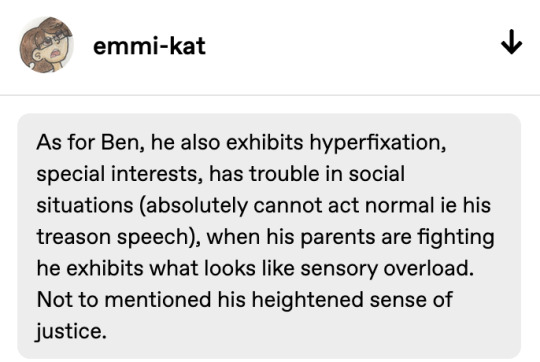
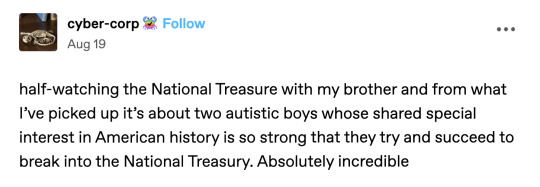
So let’s explore this!
Because it seems relevant before we dig in, I am an official member of the Squirrel Gang (ADHD) but I’m probably not autistic. I did have a “what’s the difference/do I have both?” phase, so I’m a bit familiar with the criteria, how masking affects diagnosis etc. I’ll do my best to be faithful to your experience.
Okay.
While official diagnosis is definitely not everything when it comes to neurodivergence, we’ll start with the DSM-5 criteria for autism so we have a common framework to reference from.
I thought these two sites had particularly good breakdowns, one in table form and one in infographic and prose form.
Basically, there are two main diagnostic ‘buckets.’ Group A is about “Persistent differences in communication” and consists of three subcategories. All three must be present for diagnosis. Group B is about repetitive behaviors and interests, and two of the four subcategories are required for diagnosis.
Parts C-E are more of a check after A and B are met, so we’ll deal with those last.
I’ll also be adopting the convention of changing the DSM’s language of “deficits” to “differences” throughout, because fuck that.
BENJAMIN FRANKLIN GATES
A1. “Differences in social-emotional reciprocity.”
In adults this can look like “difficulty initiating or sustaining back and forth conversation; tendency to monologue without attending to listener cues; unusual response to greetings or other social conventions.”
Ben certainly does have a few unusual responses to conversation. When he meets Abigail for the first time, he’s on a very serious mission (his last chance to save the Declaration of Independence without committing a felony) but the first words out of his mouth are about her accent. Then at the end of that conversation, once he realizes she’s not going to engage with him on the topic anymore, he jumps up to end the conversation quickly and awkwardly, only reengaging with her when he brings up the GW buttons again. Ben offers no small talk that is not related to American History.
During the gala, he doesn’t seem to realize that Abigail and Stan are weirded out by his toast to high treason and enthusiasm for entrail-based punishments.
After he and Riley rescue Abigail from the catering truck, he asks her “Are you hungry?” This reads to me as an attempt to startle her out of her shock long enough to get an answer to his actual question (“Are you alright?”), but still.
And Ben Gates doesn’t not have a tendency to monologue. This is especially apparent in Book of Secrets, where he consistently talks over Abigail and Riley without listening to them. Though, as always, I do not think BoS was well-written or particularly in-character, so I treat it as canon only when it suits me.
A2. “Differences in nonverbal communicative behaviors used for social interaction”
This section is about difficulty understanding non-verbal social cues, tendency to minimally communicate through facial expression and gesture, dislike of eye contact, and difficulty moderating tone/volume of voice.
Once of the main points of evidence of this is that fact that Ben seemingly did not have any idea that Ian was a criminal, that Shaw brought a gun on the Charlotte expedition, or that they were going to turn on him at any moment.
Ben Gates is a smart man, but he’s blind to this either because he’s so desperate to find the Charlotte that he’s ignoring any troubling signs, either consciously or subconsciously, and/or he genuinely cannot read them. He might be completely unaware of the power dynamics between Ian, Shaw, and the rest of the crew, with are portrayed via tone and body language throughout the film.
Ian and Ben also agree that Ben cannot bluff. While he does manage to fool Ian at the end of the film, both other times when Ian brings up bluffing—on the Charlotte and in front of Trinity Church—Ben looks like a deer caught in the headlights.
When he gets the instructions to jump off the Intrepid, Ben doesn’t have to fool anyone, because the agents are too far away to see what he’s doing and he straight-up tells Sadusky what he’s going to do.
Headcanon alert: We know Ben has played poker with Ian. While you could certainly believe that Ian and the gang were play low-stakes cards sometimes to entertain themselves, I absolutely prefer to believe that Ben was running out of resources for the search and found his way into a back room poker game in a desperate bid to buy himself a little more time. At first, Ian saw a mark he could swindle out of his last few hundred dollars, but as Ben kept going on about this treasure and a girl named Charlotte, he got a much more lucrative idea.
In the tone of voice category, we have the exquisitely delivered “Rheallhy?” Ben also has a tendency to mumble to himself, as when Sadusky is playing with the glasses and he says,
BEN
There’s more to it.
It’s hard for me to tell how Ben does as far as eye contact goes, but what’s very clear is that the time he does purposefully make extended eye contact it’s awkward as shit.
A3. "Differences in developing, maintaining, and understanding relationships"
This is the part where I just copy + paste the Nic Cage and the Art of Weirdness article to answer this prompt.
As a recap, we looked at the version of Ben presented in the 2003 script (just before Cage signed onto the movie) and the final character, and noted how Ben became less social and more isolated in the final film. References to previous girlfriends and an ongoing friendship with Riley are gone, as is the landlady whom he’s friendly with, etc. The film version of Ben Gates is someone who doesn’t seem to be particularly close to anyone, other than the people he needs for the treasure hunt (Ian and Riley).
So there’s some plausible evidence in all three subcategories of Group A. Let’s move on to Group B! (Remember, we only need 2/4 here.)
B1. “Stereotyped or repetitive motor movements, use of objects, or speech”
Ben does not strike me as a particularly stimmy person. Unless he’s doing actions directly related to the treasure hunt, he’s often framed as the still, stable center while Riley bounces around him.


(In these scenes, this blocking represents Ben’s resolve and the peace he’s made with his decision to steal the Declaration, versus Riley’s reticence and need to find another way out.)
He does do this thing, where he circles a finger over his temple,

which I adore because he’s being so intense and patiently righteous about it, but without other similar examples, I wouldn’t call this more than neurotypical levels of stimming.
B2. “Insistence on sameness, inflexible adherence to routines, or ritualized patterns of verbal or nonverbal behavior”
We meet Ben Gates during the two wildest weeks of his life, and he doesn’t seem to be clinging to a set routine. We get so few glimpses of his regular daily life that it’s hard to support.
B3. “Highly restricted, fixated interests that are abnormal in intensity or focus”
Do I even have to answer this one?
Boy hears story.
Boy spends next 30 years obsessively pursuing story.
Boy steals Declaration of Independence to prove story is true.
My guess is that it’s Ben’s lifelong fixation on the treasure and American history what gets people looking at whether he’s ND in the first place. Lmk if it was something else for you though!
B4. “Hyper- or hyporeactivity to sensory input or unusual interest in sensory aspects of the environment”
I don’t know that I would have considered this outside of the scope of this topic, but yeah, I could see a case for Ben being hyposensitive. He stabs his thumb on the Charlotte like it’s a pretty easy and normal thing to do. It’s Riley who really flinches, not Ben.
When he jumps off of the Intrepid, he doesn’t seem sore or cold afterward. Yes, the henchmen bring him dry clothes, but he doesn’t seem physically phased by such a dramatic stunt.
So we can meet the two out of four requirement here as well.
Groups C-E
These groups can be asked as three questions:
C. Were the symptoms present in early development?
We only see young Ben for a few minutes, but when we do he is already interested enough in the treasure to sneak into the attic to learn about it, and we know he gets obsessed with the legend that night and never lets it go.
Without additional information, we can say yes.
D. Do the symptoms cause clinically significant impairment?
While none of what we’re discussing here seems to impair Ben’s treasure hunting ability, I do think it’s be easy to make a case that this globetrotting treasure hunter gig is one of the only ones he’s well suited for. If Ben were forced to work an office job, for instance, I do not see him succeeding in that environment. I don’t know that he’d get the hierarchy, why he can’t just do what he wants, when he wants, that not everyone is driven by a greater purpose larger than themselves, etc.
So sure, check that off.
E. Are these disturbances not better explained by intellectual disability?
No. This seems self explanatory.
Congratulations! Benjamin Franklin Gates is fully diagnosable with autism if you so wish!
But what if you don’t wish?
Caveats and such
Well, first of all, you’re allowed to see fictional characters however you want to. The Ben Gates you have in your head is ever so slightly different from the one I have in mine, and the one another reader has in theirs. If it’s important to you that he’s autistic, or allistic, or whatever, then he is.
And there’s a big asterisk I have to put on this assessment. Well, actually 2.
One, I am not a trained professional, and fictional character Ben Gates was not here to answer these questions himself.
Two, there’s a caveat to all of this analysis, a loophole, and I already brought it up:
We only see Ben Gates during the two weirdest weeks of his life.
So yes, could he struggle with eye contact and reading social cues and that’s why he’s so unhinged during the toast? Absolutely.
But he’s also like, a would-be history professor about to commit a major crime with one week of preparation. He’s not the slick professional we’re used to seeing in heist movies like Ocean’s Eleven, nor is he a highly trained Bond-style hero who’s ready for anything. He’s a regular (ish) person about to do something he can never take back. How is he supposed to be “normal” in that situation? What does that even look like?
The only food we see him eat is a microwaved Stouffer’s lasagna. Is that because he relies on the predictable taste and texture of processed foods, or because he’s been planning a heist all week and doesn’t have time for anything else? You decide!
Is he hyposensitive to pain, or is he just an action-adventure protagonist who’s expected to action-adventure without getting a scratch until the plot demands otherwise? He could be both!
Conclusion
Personally, while I like this reading of the character, I’m not sure I consider it ‘basically canon’ the way I do some other ND headcanons, in large part because we spend so little down time with Ben. I have no idea what his regular life is like.
I was looking through my favorite/personal ND headcanons, and most of them are from TV shows rather than movies. I think that’s precisely because long-term behavior patterns are so much more apparent in people you spend weeks or years with.
However, as a matter of fic and headcanon, I love this! Because there you can spend as much time with Ben as you want to. It opens up so many opportunities to add my very favorite thing in fictional narratives: texture.
Did Ben truly have no idea what Ian was capable of?
Does all this adventuring make his samefoods hard to come by?
Does he hate the feeling of wet clothing, because hoo boy, he is having a Bad Time™ in Book of Secrets.
Is a tiny part of what keeps him pursuing the treasure the knowledge that he can’t function very well in any world except the one he’s created for himself?
So many possibilities!
What did I miss?
What are some of your favorite autistic Ben moments and headcanons?
Next time, Abigail!
8 notes
·
View notes